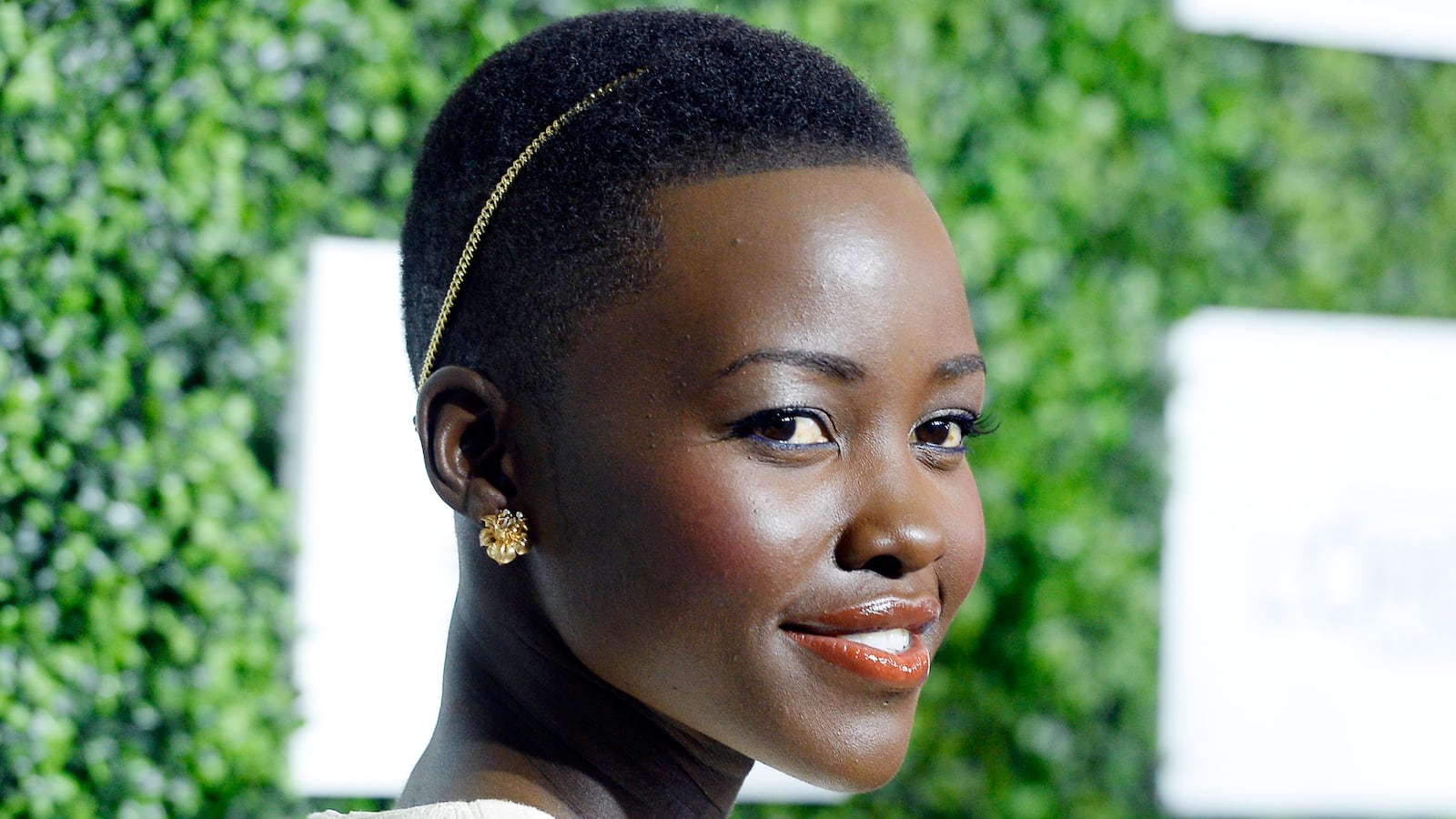Lupita Nyong’o’s powder-blue Cinderella Oscar gown nearly halted the Internet in its live-blogging tracks. Moments after the Mexico City-born, Nairobi-raised, Brooklyn-based actress appeared on the red carpet, all charm and sweetness, photos of her custom Prada dress began circulating on social media. There were memes, marriage proposals, and a sense that Nyong’o, who won the Best Supporting Actress Oscar for her role in Steve McQueen’s acclaimed 12 Years a Slave later that night, was rousing a kind of adulation usually reserved for Beyoncé-level celebrities.

Nyong’o is adored for many easily understandable reasons: She is gracious, beautiful, and an incredible talent who arrived in Hollywood practically a star, her brand laser-focused. Over the months-long promo and awards season, she made nary a style miss; her handlers obviously understand the strategic importance of landing on as many best-dressed lists as possible. Nor did she misspend any public speaking opportunity on fluffy PR talk: Her ability to draw tears with a 30-second long acceptance speech or an easily GIF-able late night talk show interview are the result of studious perfection.
The accolades and accomplishments are difficult to count: among other things, Nyong’o was nominated for dozens of awards for her role in 12 Years, named People’s Most Beautiful, became a face of Miu Miu’s Spring 2014 collection, and signed a presumably lucrative and wildly exalted beauty deal with Lancôme. All of which, combined, mean that prominent film and entertainment offers will begin rolling in, putting her on the path to guaranteed longevity.
But amidst the praise from peers and the general public, one of the most notable threads of Nyong’o’s newly public life has been her acknowledgement of the fact that her success is near-unprecedented. That she is dark-skinned, African, and wears her hair short and natural is borderline revolutionary in Hollywood and white supremacy-governed America, where racialized people have long been violently subject to white standards of beauty. Her Essence Black Beauty Award acceptance speech, for instance, reflected that sentiment:
“I remember a time when I too felt unbeautiful. I put on the TV and only saw pale skin. I got teased and taunted about my night-shaded skin. And my one prayer to God, the miracle worker, was that I would wake up lighter-skinned…When I saw [supermodel Alek Wek] I inadvertently saw a reflection of myself that I could not deny. Now, I had a spring in my step because I felt more seen, more appreciated by the far-away gatekeepers of beauty.”
The Lupita Nyong’o Lookbook (Photos)

As the world grows to see in Nyong’o’s beauty what she saw in Wek’s as a child, there are many conversations to be had. There is much to celebrate, of course. But, by the same token, it’s important to note the contradictions in Hollywood’s newfound obsession with her. Explaining the perceivable differences in how Nyong’o and Precious star Gabourey Sidibe were treated, Anita Little wrote on Ms. Magazine’s blog:
"But obviously there’s a marked difference between who is allowed to represent ‘black beauty’ and who isn’t. It’s apparently become okay to have black features like Nyong’o, but you still have to come in the right shape. You still have to be able to squeeze into sample sizes and look at home in a magazine photo shoot. You need to be dainty and petite, soft and feminine. Though Nyong’o's ubiquity will do much for elevating the acceptance of black women, it’s difficult to imagine Sidibe would ever have been put in the same position."
It’s a fair criticism and an important one. It also translates beyond beauty. Nyong’o has a particular social and cultural pedigree that allows her to fit into a mold of blackness that America finds acceptable: She is an Ivy League graduate, speaks four languages, and comes from Kenya’s globally recognized political class. For instance, her accent and diction, which are of the pleasant, universally fêted TransAtlantic variation, will likely insulate her from the racist “ghetto” stereotypes that are the default for many black people. While none of this will shield her from racism, it grants her privileges that other black people are actively denied.
But there is also something potentially more corrosive happening. As Nyong’o’s star rises, she’s increasingly being used as an example of the mythical post-racialism that was supposedly ushered in with the election of Barack Obama. Her success in defiance of the odds is easily misinterpreted as proof that Hollywood, and by extension America, is not as racist a place as it actually is. But the post-racial narrative is a dangerous one that obscures reality in favor of assuaging our collective discomfort about broad inequality.
Observers have been quick to describe Nyong’o’s success as an epoch-making shift for black people and the black condition. But that ascribed weightiness is superficial and betrays a fundamental misreading—whether through optimism or naïveté or something as sinister as an intentional co-opting of her narrative—of what the reality is. Seeing Nyong'o on the cover of People, for instance, might very well inspire young women to feel more confident in their skin, but, in the grand scheme of the centuries-long war on black people and black bodies, it is an insignificant moment incapable of counterbalancing the daily drum of white supremacist messaging.
Explaining the concept of post-racialism in Salon in the context of the Trayvon Martin case, Britney Cooper wrote:
“Post-racial thinking is insidious not only because it gives lie to the very real and continuing material consequences of racism in this country, but also because it seduces young, optimistic, idealistic black youth into identifying with the very systems and people who would kill them without a second thought—and then go order a pizza and take a nap.”
For every Lupita Nyong’o, whose high profile is presumed to mean that a broader range of roles are on the horizon, there are untold hundreds of black actors found fit only to play gangsters and servants. “It’s frustrating that the movies I want to make I haven’t been able to make,” Anthony Mackie told 24 Frames, articulating a disappointment that is considered all too common in Hollywood. “Orlando Bloom was given 15 opportunities after Lord of the Rings. Black men are given no opportunities.” There’s no telling what will come next for Nyong’o, but it is already apparent that she is an exception and not the rule, and to minimize that is to do the truth a great injustice.





